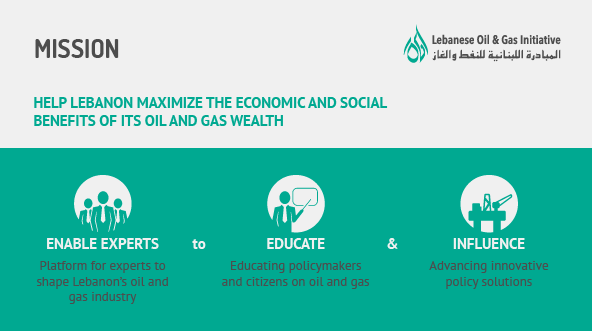This article was originally published on the Natural Gas Europe webiste, and can be accessed on this link.
Natural Gas Europe is pleased to support the efforts of The Lebanese Oil and Gas Initiative (LOGI) in promoting transparency, accountability, sound governance, and engagement with the public to ensure the interests of citizen stakeholders are preserved. Natural Gas Europe encourages the development of similar oil and gas non-governmental organizations.
The Lebanese Oil and Gas Initiative: Promoting Sound Management of Lebanon's Oil and Gas Wealth
The Lebanese Oil and Gas Initiative (LOGI) is a newly established non-governmental organization (NGO) based in Beirut, Lebanon, that promotes the transparent and sound management of the country’s hydrocarbon resources. LOGI aims to tap into its network of experts from around the world to assist the government in key decisions that will shape and determine Lebanon’s oil and gas future. Beyond offering decision-makers academic and expert support to ensure Lebanon maximises the benefits of its future oil and gas riches, LOGI is determined to provide the public with information on Lebanon’s oil and gas potential, and equip the people of Lebanon with the necessary tools to question the representatives, demand solid answers, suggest solutions and participate in Lebanon’s path towards energy production - and export.
Lebanon's pre-qualification round in spring 2013 attracted some of the world’s biggest players in the energy scene including TOTAL, ENI, Shell, Statoil, Chevron, and ExxonMobil. Despite the success achieved at the pre-qualification round, and the country's high energy appeal in comparison to its neighbours, the country has failed to launch its first licensing round delayed by its inability to issue two decrees that are essential for tendering Lebanon’s acreage, one delimitating the blocks open for bidding and the second laying out a model for future Exploration and Production Agreements (EPA). Lebanon's complex political make-up generally delays effective decision-making and the efficiency of public institutions. Whilst regional agreements are being shaped by other Eastern Mediterranean countries ahead in the game, a late entry in the gas market could jeopordize Lebanon’s chances of securing gas deals. Furthermore, the uncertainty around future gas prices makes it difficult to predict the commercial viability of energy endeavours and is an additional reason why Lebanon must accelerate its efforts. The potential hydrocarbon wealth under Lebanon’s seabed constitutes a one-time opportunity for Lebanon. The Lebanese government's struggle to move this process forward amid political complications was the main catalyst to create LOGI.
LOGI believes a successful oil and gas sector requires informed citizens and an informed government. Lebanon has not yet commenced exploration activities; it is therefore impossible to predict in advance if Lebanon holds any hydrocarbon reserves in its waters. Managing people's expectation via a clear, straight-forward and easy to grasp communication strategy is essential to LOGI. Coordination across various stakeholders including civil society, businesses, government and international organizations is also key. LOGI sees itself as a facilitator between citizens, public and private sectors.
LOGI’s objective is to develop a network of Lebanese experts in the global energy industry and provide them with a platform to inform Lebanese policymakers as well as Lebanese citizens on various issues facing the oil and gas industry. If properly financed, governed and connected together these concerned Lebanese citizens, regardless of their location, could have a tangible and real impact on Lebanon. LOGI will focus on public awareness, policy development and advocacy, capacity building and technical assistance to help Lebanon maximize the economic and social benefits of its oil and gas wealth – and avoid the resource curse.

LOGI has launched a crowdfunding campaign to fund initial projects. The notable success of the campaign is a great indicator of the level of trust that LOGI was able to generate and is a great encouragement for LOGI to continue its efforts for the service of Lebanon and the Lebanese. LOGI was created by a group of young Lebanese professionals from around the world who were motivated by the necessity to support a vital sector for the future of Lebanon: Lebanon's potential oil and gas industry. LOGI's team works with the absolute determination to turn Lebanon into better place. The biggest challenge might be to restore the public’s confidence in the government, in the power of the civil society and most importantly...in itself! All Lebanese must work together to help our country, help ourselves and ensure we, and future generations, benefit from our god-sent gift. You can support us by donating to the campaign, by joining our team and by spreading the word!
Link to the campaign: http://www.zoomaal.com/projects/logi?ref=17965530
Link to the website: http://logi-lebanon.org/
Youtube video: https://www.youtube.com/watch?v=g4qrJSQx3Gk&app=desktop
Karen Ayat is an analyst and Associate Partner at Natural Gas Europe focused on energy geopolitics. Karen is also a co-founder of the Lebanese Oil and Gas Initiative (LOGI). She holds an LLM in Commercial Law from City University London and a Bachelor of Laws from Université Saint Joseph in Beirut. Email Karen [email protected] Follow her on Twitter: @karenayat